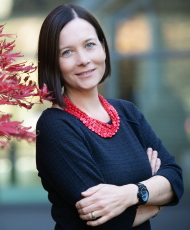Natasza Styczyńska – holds PhD in political science (2015) and is Assistant Professor at IES. Her research interests include politics in Central and Eastern Europe and the Balkans, Euroscepticism and populism in the context of European integration (EU enlargement policy). Dr Styczyńska represents Jagiellonian in the Europe and the World cluster (European Universities Alliance UNA Europa). She is the coordinator of the CEEPUS network "Europe from the Visegrad and Balkan Perspective" and a the vice-chair of the Social Sciences and Humanities Working Group of the Coimbra Group. Since 2022 she is Joint BA in European Studies (BAES) director of studies at Jagiellonian. Awarded the Rector's Award for organisational (2016, 2017, 2018) and academic achievements (2019, 2020, 2022). She has given guest lectures in Europe, Asia and South America and is a visiting professor at the University of Bologna (Forli campus). Involved in many research and educational projects (JM Module, Jean Monnet Network) and the organisation of summer schools, workshops and open lectures in collaboration with, among others, the academic network The Europaeum, The Financial Times, the European Commission Representation in Poland and the Genshagen Foundation.
Research stay: University College London (2017), University of Vienna (2019), University of Belgrade (2021)
Visiting professor: Pompeu Fabra University (Spain), Deusto University (Spain), ELTE (Hungary), University of Vienna (Austria), University of Pecs (Hungary), Corvinus University (Hungary), Kliment Ochridski University (Bulgaria), Matej Bel University (Slovakia), University of Montenegro, University of Zagreb (Croatia), Azerbaijan Diplomatic Academy (Azerbaijan), The National Autonomous University of Mexico, International University of Rabat (Morocco), Symbiosis International University (India), Jindal University (India), Guangdong University of Foreign Studies (China), Osaka University (Japan)


